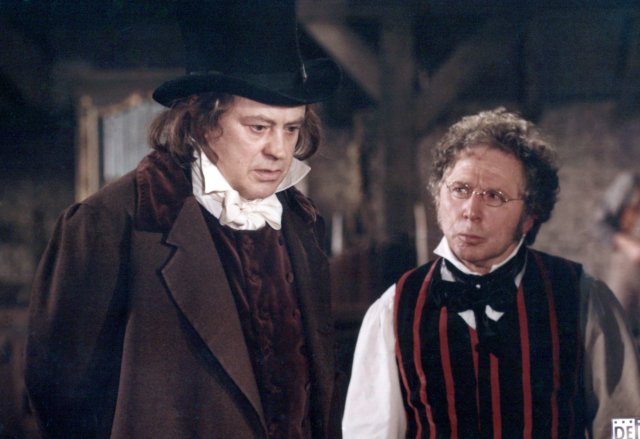Making connections between author and recipient clear: “Beethoven – Days from a Life,” for which Kunert wrote the script
Photo: Defa Foundation
After his remarkable book with personal testimonies by Wolfgang Kohlhaase, Günter Agde is now presenting another, very well-researched book on the Defa story: “Kunerts Kino”. It’s about the film and television work of the versatile writer Günter Kunert (1929–2019), who was one of the first to sign the petition against the expatriation of Wolf Biermann and lived in the West from 1979 – with an exit visa.
»Kunerts Kino« contains his scripts, film drafts, writings and letters, arranged chronologically, which were previously only partially accessible and if so, then only in various, often remote places. By compiling the documents, this anthology broadens and specifies the view of Kunert towards an author who regularly acted artistically in film and television. At the same time, it broadens the view of Kunert’s oeuvre. In the film and television history of the GDR, it is often reduced to the banned television production “Fetzer’s Escape” (1962), which was previously successfully broadcast as a radio play, and the banned feature film “Monologue for a Taxi Driver” (from the same year).
nd.Kompakt – our daily newsletter

Our daily newsletter nd.Compact brings order to the news madness. Every day you will receive an overview of the most exciting stories from the world editorial staff. Get your free subscription here.
In his clever afterword, Agde suggests that with both productions in the VI. At the SED party conference, at which television was named as the most important audiovisual mass medium, both films probably served as examples to stop and discipline further film experiments. The interview with Kunert from 1990, which is printed next to the scripts in the book, gives his retrospective look at the early 1960s.
The anthology begins with the writer’s five works for the satirical short film series “Stacheltier” produced by Defa. It was during this early period that his generalized comments on satire, which were printed in the book, were written. With them he joined a larger group of GDR artists who, particularly in the 1950s, theoretically questioned their work and thus their own self-image. They all saw their public reflection as their own contribution to building a better, socialist society.
He criticized the weaknesses of German cinema culture, but also the schematism in Defa films as “Dr. Now, Specialist in Satire,” a series that he published every 14 days for a year in the popular, high-circulation magazine “Filmspiegel.” Like all of his texts, they are characterized by brevity and an unusual linguistic density. At the end of this series, Kunert reflected on the need for film criticism in a longer essay.
Apparently little is known about Kunert’s early television work. In the late 1950s and early 1960s he wrote several scripts for various serial productions in the developing medium. At the beginning of the 1960s he submitted the first drafts for possible feature films to the Defa studio. He first had problems with his project “A Yankee in King Arthur’s Court,” a film adaptation of Mark Twain’s novel of the same name, which was rejected twice. You can read the reasons given by the studio management at Agde, as well as the exposés on several rejected film material and Lilly Becher’s comments and objections to “Farewell”, the film adaptation of her husband Johannes R. Becher’s autobiography.
One of the surprises in the book are the hand drawings by Kunert, who enrolled at the art college in Weißensee in the immediate post-war period. They visualize the texts for the animated films “Everyday History of a Berlin Street” and “Zentralbahnhof”. The graphics underline Kunert’s curiosity about reality, which did not provide quick answers. Here and in many other places it also reflects his examination of his own childhood and early youth experiences.
Kunert’s collaboration with Defa ended with the scenarios for “Beethoven – Days from a Life” (1976) and “On the Road to Atlantis” (1977). In the West he continued to write scripts for television films on ARD and ZDF. They are all recorded in the extensive filmography.
In his notes on the Beethoven film, Kunert wrote that it is the essence of art to make clear “relationships and connections between the individual recipient and his environment, his past and present, even with himself.” His very different works are held together in a very entertaining way by his reflections on cinema.
Günter Agde (ed.): Kunert’s cinema. All of Günter Kunert’s texts for and about films. Edition black print, 348 pages, hardcover, €28.
Subscribe to the “nd”

Being left is complicated.
We keep track!
With our digital promotional subscription you can read all issues of »nd« digitally (nd.App or nd.Epaper) for little money at home or on the go.
Subscribe now!
judi bola link sbobet sbobet88 judi bola
